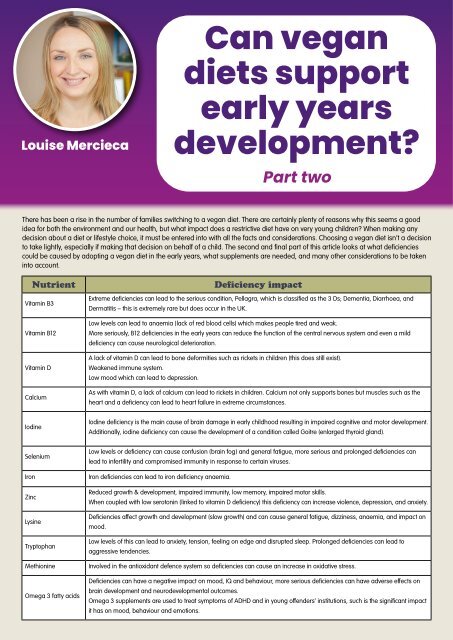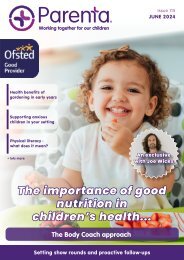November 2023 Parenta magazine
Create successful ePaper yourself
Turn your PDF publications into a flip-book with our unique Google optimized e-Paper software.
Louise Mercieca<br />
Can vegan<br />
diets support<br />
early years<br />
development?<br />
Part two<br />
There has been a rise in the number of families switching to a vegan diet. There are certainly plenty of reasons why this seems a good<br />
idea for both the environment and our health, but what impact does a restrictive diet have on very young children? When making any<br />
decision about a diet or lifestyle choice, it must be entered into with all the facts and considerations. Choosing a vegan diet isn’t a decision<br />
to take lightly, especially if making that decision on behalf of a child. The second and final part of this article looks at what deficiencies<br />
could be caused by adopting a vegan diet in the early years, what supplements are needed, and many other considerations to be taken<br />
into account.<br />
Nutrient<br />
Deficiency impact<br />
Vitamin B3<br />
Vitamin B12<br />
Vitamin D<br />
Calcium<br />
Iodine<br />
Selenium<br />
Iron<br />
Zinc<br />
Lysine<br />
Tryptophan<br />
Methionine<br />
Omega 3 fatty acids<br />
Extreme deficiencies can lead to the serious condition, Pellagra, which is classified as the 3 Ds; Dementia, Diarrhoea, and<br />
Dermatitis – this is extremely rare but does occur in the UK.<br />
Low levels can lead to anaemia (lack of red blood cells) which makes people tired and weak.<br />
More seriously, B12 deficiencies in the early years can reduce the function of the central nervous system and even a mild<br />
deficiency can cause neurological deterioration.<br />
A lack of vitamin D can lead to bone deformities such as rickets in children (this does still exist).<br />
Weakened immune system.<br />
Low mood which can lead to depression.<br />
As with vitamin D, a lack of calcium can lead to rickets in children. Calcium not only supports bones but muscles such as the<br />
heart and a deficiency can lead to heart failure in extreme circumstances.<br />
Iodine deficiency is the main cause of brain damage in early childhood resulting in impaired cognitive and motor development.<br />
Additionally, iodine deficiency can cause the development of a condition called Goitre (enlarged thyroid gland).<br />
Low levels or deficiency can cause confusion (brain fog) and general fatigue, more serious and prolonged deficiencies can<br />
lead to infertility and compromised immunity in response to certain viruses.<br />
Iron deficiencies can lead to iron deficiency anaemia.<br />
Reduced growth & development, impaired immunity, low memory, impaired motor skills.<br />
When coupled with low serotonin (linked to vitamin D deficiency) this deficiency can increase violence, depression, and anxiety.<br />
Deficiencies affect growth and development (slow growth) and can cause general fatigue, dizziness, anaemia, and impact on<br />
mood.<br />
Low levels of this can lead to anxiety, tension, feeling on edge and disrupted sleep. Prolonged deficiencies can lead to<br />
aggressive tendencies.<br />
Involved in the antioxidant defence system so deficiencies can cause an increase in oxidative stress.<br />
Deficiencies can have a negative impact on mood, IQ and behaviour, more serious deficiencies can have adverse effects on<br />
brain development and neurodevelopmental outcomes.<br />
Omega 3 supplements are used to treat symptoms of ADHD and in young offenders’ institutions, such is the significant impact<br />
it has on mood, behaviour and emotions.<br />
Supplementing a diet may be easier said<br />
than done! Some children can’t chew<br />
a chewy supplement (if they are very<br />
young), there may be issues over the<br />
coating of the supplements and goodquality<br />
ones can be very expensive. It<br />
is necessary to supplement though as<br />
nutritional deficiencies can have life-long<br />
consequences, so supplement research is<br />
essential.<br />
Other considerations<br />
If you are considering an alternative diet<br />
or must restrict certain elements due<br />
to allergies, then this may be possible<br />
without going entirely vegan, this would<br />
certainly ease some of the restrictions.<br />
There’s no reason why we all can’t enjoy<br />
plant-based meals several times a week,<br />
indeed this would be preferable for our<br />
health and our environment.<br />
There has been a rise in vegan produce,<br />
making it a lot easier to shop for ‘meatfree’<br />
alternatives but please shop with<br />
caution as just because a product<br />
is vegetarian, or vegan, it does not<br />
necessarily mean it is ‘healthy’.<br />
Ultra-processed foods<br />
(UPFs)<br />
The vegan and vegetarian market is no<br />
different to the rest of the food landscape.<br />
There is now a wide variety of products<br />
aimed at convenience. Vegans can opt<br />
for processed burgers, sausages, pies<br />
etc. that may be marginally healthier than<br />
their meat alternatives but are still ‘overprocessed’<br />
and likely to contain artificial<br />
ingredients and ‘fillers’ that make a<br />
product convenient but not healthy. To get<br />
the most out of a vegan diet it is necessary<br />
to plan, prepare and cook properly and<br />
not rely on ready-made options.<br />
Vegan children<br />
Is it possible? Technically yes, with careful<br />
planning, consideration of all nutrients<br />
needed and supplementation. But is it<br />
easy? No.<br />
You will spend a large percentage of your<br />
time scanning labels and menus until you<br />
are confident with your own shopping<br />
choices. For fully developed adults, it<br />
can be a healthy lifestyle choice. For<br />
developing children, it can be incredibly<br />
detrimental if not implemented effectively.<br />
If you are embarking on a vegan lifestyle<br />
for your family, please embrace the full<br />
variety of natural plant-based options<br />
available, seek professional guidance and<br />
remember that many essential nutrients<br />
will need to be supplemented.<br />
Scan here for<br />
more information<br />
& resources<br />
from Louise:<br />
parenta.com | <strong>November</strong> <strong>2023</strong> 19
















